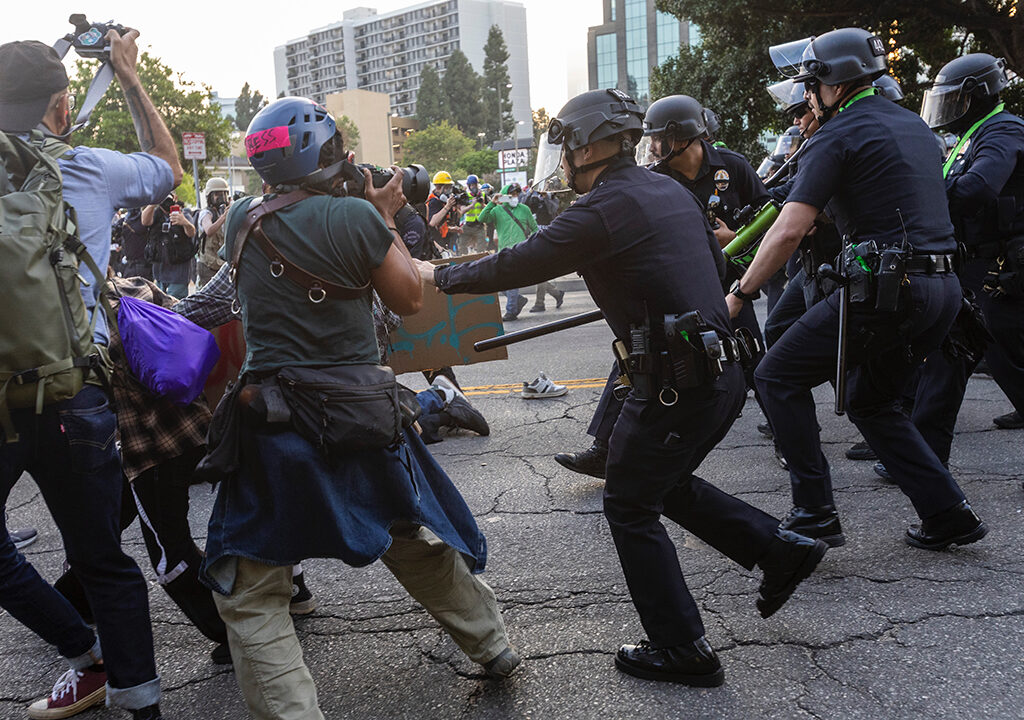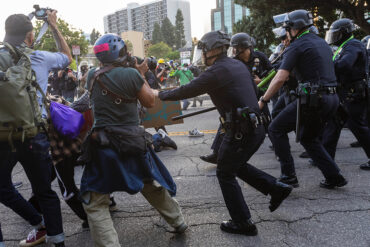
Media Contact: Carmen Ramos Chandler, carmen.chandler@csun.edu, (818) 677-2130
A few years ago, California State University, Northridge journalism professor José Luis Benavides sat on a Society of Professional Journalists panel examining the role of the news media covering immigration before Donald Trump’s first presidency.
While the other panelists were self-congratulatory about the work journalists did, Benavides was not so enthusiastic.
“I think I was the only one who wasn’t,” admitted Benavides, who teaches in CSUN’s Mike Curb College of Arts, Media, and Communication.
He pointed to the now defunct Munich Post. For a decade, the Munich Post was the only German newspaper to closely examine and challenge the ideas of Adolf Hitler and the Nazi Party before their accession to power. The paper was shut down by Hitler in 1933 immediately after he because Reich Chancellor.
“The Munich Post is a testament to what journalism is supposed to be doing today, even at the risk of censorship, jail or destruction, which actually seems like a possibility with this current Trump administration,” Benavides said. “I think the best journalism, the journalism that will survive the time that we live in, is not really the two-sided journalism that we’ve become accustomed to. It is the journalism that is adversarial to the government.”
“We forget that democracy is still an incomplete project of this country,” he said. “We currently have people in charge who are hostile to certain segments of the population and are willing to do harm to people without fear of consequence. It is the role of journalists to take those risks and call out what they see. Sometimes, there aren’t ‘two sides’ to the story. Sometimes it’s truth vs. lies. It’s the journalist’s job to call out the lies and the consequences of the actions of those in charge.”
Benavides noted that when the First Amendment, which protects the freedom of the press, was crafted by the nation’s founding fathers, the news media did not exist in the form we know now. In addition to newspapers, there were also broadsides and pamphlets like those of Thomas Paine, who advocated the right of the people to overthrow the government. After the American Revolution, he regularly published pamphlets attacking those he felt betrayed him and even argued against religion in general and Christian doctrine in particular.
“This idea of the presumed neutrality of media professionals didn’t really exist until the 20th century,” Benavides said. “It was to defend the credibility of the journalist and essentially raise the status of a journalist to that of a social scientist, with the assumption being that the methodology of collecting news was objective, as seen through a social scientist perspective. Ergo, what journalists were reporting, the news product they were producing, was a real reflection of what happened.”
Throughout history, he said, newspaper owners used their publications to promote their agendas and sway a political vote. But the owners, often individuals in the community, also saw their papers as a service to the communities they lived in.
“With the advent of broadcast television, broadcasters were required to produced news shows in service to the public in exchange for being able to use publicly owned airwaves to make money with entertainment shows,” Benavides said. “To regulate the media, the government established rules that required broadcasters to present ‘both sides’ on their newscasts. If they talked to one side of an issue, they had to talk to the other for their story. This devolved into the idea that the only two sides in politics are the sides of the established political parties.”
Broadcasters soon realized that news shows were popular with viewers and revenue generators, he said.
“Suddenly news becomes a business, and owners are no longer individuals who are vested in their communities, but rather stockholders and venture capitalists who are more interested in their bottom line than what is good for the citizenry,” Benavides said.
This became particularly apparent with the Trump administration’s attacks on CBS’s “60 Minutes,” which is known for its hard-hitting journalism and its reporters’ and producers’ fearlessness in asking tough questions, regardless of the subject, he said.
“You have a some very talented, respected journalists leaving the news show because it appears that its owners are more concerned with money and a business deal than serving the citizenry,” he said. “This kind of government attack makes more visible the weakness of the system because news really shouldn’t be a commodity. News shouldn’t be a business where the bottom line is all that matters. It is supposed to be providing a service to the community.”
Hoping to take up that responsibility, several new news entities have appeared online and on social media. Some are based on a nonprofit model and are made up of veteran reporters looking for alternatives to traditional media to get news to the public. Others have been launched by concerned citizens who make their ideological leanings clear but are concerned that the public is unaware of important information.
“The problem is the nonprofits may not have the financial wherewithal to hold off an attack if the president, or government, decides to go after them and others do not have the journalistic training necessary to do more than just reporting what they saw,” Benavides said. “Many people can testify that they were there, but one of a professional reporters’ jobs is to put what they saw into context, where it sits in the bigger picture and the implications of what they saw.”
Regardless of the news source, Benavides said, “one of the most challenging tasks of journalism today is responding to what is happening at what appears to be an almost frantic pace.”
“Journalistic practices are built on the idea of trusted government sources,” he said. “So, when you have government officials that are not only not trustworthy, but are openly conspiratorial, journalists really do damage to society by just replicating what the government official is telling you when you know that what is being said is driven by a conspiracy that has no basis in fact of any kind.”
“President Trump does that all the time, but he is never presented as an unreliable source of information.”


